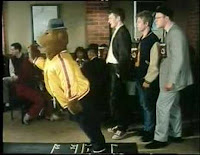For almost 300 years, advertising has helped to fund content. First appearing, as far as I can tell without a comprehensive google-day, in early to mid 1700's magazines. Over time advertising has spread to radio, TV, and now the internet - helping to provide the content that billions use every single day. "I'll just skip through 700 pages of advertisements to get to the first article in this copy of in-flight magazine/GQ/Cosmopolitan/etc."
 |
| Well maybe just another spoonful... |
The sad lack of support from many towards public broadcasters like the BBC and the ABC shows that this fundamental agreement is still technically in place, and as popular as it ever has been. Except that is, in one place.
Well, I say one place, It's really many. That's the internet obviously,
It seems that outside of a few small home made blogs, the link between advertising and content is less clear, and far more disliked. People have got used to free content with no strings attached. I like all people, get grumpy when a 30 second ad appears on my You Tube content. I left Myspace because the banner hell made it an unusable mess. I skip 98% of all video ads... but I still know why those ads are there, and it seems like many have forgotten, or are holding out as long as possible from accepting the truth: The internet NEEDS advertising support.
Yet ad blockers continue to grow in usage.
Netflix, along with Spotify and others have shown that people WILL subscribe to good content if it is well priced. But when it comes to smaller scale content like news and magazines, they are much less keen to get out their proverbial digital wallets.
It's the same mistake many agencies made in assuming that 'social' was free. They saw organic reach as a mythical unicorn. Failing to realise that it still requires time and effort, and still requires a social site paying for the network you are latching onto. Yes it's frustrating that Facebook has killed organic reach, but you can hardly blame them. We all, myself included, complain when sites start reminding of the unwritten agreement. Sometimes it even drives people away. But without doing so, the only way they can survive is to mine our privacy.
Maybe one route is to create a multi-site microtransaction scheme in the same manner as Spotify. Every web page you read deducts a very small amount (E.g.: 20c from an account. Saving you from ads, but avoiding the uncertainty of paying for news and magazine content that you might not always want. After all, we've seen that paywalls are generally rubbish. If you had ONE account that could send $2 to Wall St Journal, $3 to Autosport, and $1.20 to The Guardian, I reckon people would try it out, certainly more so than access paywalled sites or pay for magazine subscriptions that they never get round to reading.
Of course, this is not to forget the very valid argument that people deserve a break from terrible advertising, and being targeted in intrusive and relentless ways. Some of the ways people are targeted now can border on harassment, no convincing way to get people to respond or change their behaviour.
Yes, we definitely need to improve the campaigns we make. But perhaps the harassment problem is the same. The reason people are being increasingly targeted in this way, is because they have forgotten the unwritten agreement when it comes to the content they love most. They've fallen into the trap of thinking that a free and open web has no cost whatsoever. Whereas we used to use advertising to hide the costs, maybe now we need to be clear and open that there is no such thing as a free internet. When you expect things to be free AND ad-free, your data becomes the cashflow.
Or to put it another way, let's take the old maxim of: Good, Quick, Cheap. Pick two.
Now it needs re-arranging into the modern internet paradigm: Free. Unintrusive, No Ads. Pick two.
 |
| The second best reason to have a VPN if you live outside of the UK |
"It may seem obvious, but this site and the resources within are paid for by the advertising within. Without this advertising we would be forced to sell your data or become paid access only. We hate terrible ads too, but if you ad block this site, it won't exist in free form for much longer."
















